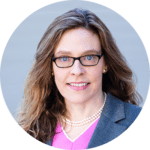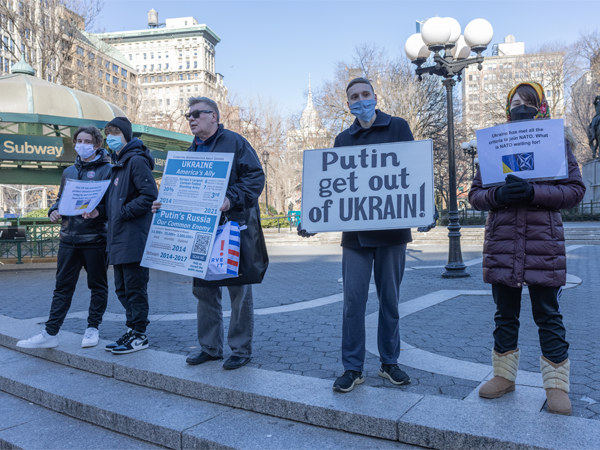Register for Zoom Webinar Watch on YouTube
Join us for a meeting of the New York-Russia Public Policy Series, co-hosted by the Harriman Institute at Columbia University and the New York University Jordan Center for the Advanced Study of Russia.
As Russian troops have amassed on Ukraine’s border, talks aimed at resolving the standoff between Russia and NATO appear to have collapsed. Poland’s Foreign Minister warned that “it seems that the risk of war in the OSCE area is now greater than ever before in the last 30 years.” Russia has been seeking a new European security agreement that would include formal binding pledges to limit NATO’s expansion and military activities across Eastern Europe. US and NATO officials respond that they will not give up on NATO’s principles, especially its “open door” policy towards membership. Ukrainians are bracing for a renewed conflict amidst domestic political turmoil.
Are the Russian and Western positions irreconcilable? How did we get to the brink of another conflict? And how would a Russian-Ukrainian war affect Russian and Ukrainian domestic politics? How would it impact Ukrainian identity and foreign policy goals?
This event is supported by a grant from Carnegie Corporation of New York.
Speakers
Keith Darden, Associate Professor, School of International Service, American University
Olena Lennon, Adjunct Professor of Political Science and National Security, University of New Haven
Olga Onuch, Associate Professor in Politics, University of Manchester
Mary Sarotte, Kravis Professor of Historical Studies, Johns Hopkins University
Maxim Suchkov, Director of the Institute for International Studies, MGIMO University
Moderated by:
Alexander Cooley, Claire Tow Professor of Political Science, Barnard College
Joshua Tucker, Director of the Jordan Center for the Advanced Study of Russia, New York University
Biographies
 Keith Darden is an Associate Professor in the School of International Service at American University specializing in comparative politics, international relations, and the politics of Eurasia. His research focuses on nationalism, state-building, and the politics of Russia, Ukraine and Eurasia. His forthcoming book, Resisting Occupation (Cambridge University Press), explores the development of durable national loyalties through education and details how they explain over a century of regional patterns in voting, secession, and armed resistance in Ukraine, Eurasia and the world. His award-winning first book, Economic Liberalism and Its Rivals (Cambridge University Press, 2009) explored the formation of international economic institutions among the post-Soviet states, and explained why countries chose to join the Eurasian Customs Union, the WTO, or to eschew participation in any trade institutions. At SIS, Prof. Darden teaches courses in international relations, comparative politics, and the politics of Eurasia. Beyond SIS, Prof. Darden is co-editor of the Cambridge University Press Book Series Problems of International Politics and is actively engaged with Russia and Eurasia though the Bilateral Working Group on US-Russia Relations, PONARS Eurasia, the Valdai Discussion Club, and other forums.
Keith Darden is an Associate Professor in the School of International Service at American University specializing in comparative politics, international relations, and the politics of Eurasia. His research focuses on nationalism, state-building, and the politics of Russia, Ukraine and Eurasia. His forthcoming book, Resisting Occupation (Cambridge University Press), explores the development of durable national loyalties through education and details how they explain over a century of regional patterns in voting, secession, and armed resistance in Ukraine, Eurasia and the world. His award-winning first book, Economic Liberalism and Its Rivals (Cambridge University Press, 2009) explored the formation of international economic institutions among the post-Soviet states, and explained why countries chose to join the Eurasian Customs Union, the WTO, or to eschew participation in any trade institutions. At SIS, Prof. Darden teaches courses in international relations, comparative politics, and the politics of Eurasia. Beyond SIS, Prof. Darden is co-editor of the Cambridge University Press Book Series Problems of International Politics and is actively engaged with Russia and Eurasia though the Bilateral Working Group on US-Russia Relations, PONARS Eurasia, the Valdai Discussion Club, and other forums.
 Olena Lennon is an Adjunct Professor of Political Science and National Security at the University of New Haven. After completing her PhD at the University of Nebraska-Lincoln, she moved back to Ukraine to fulfill her Fulbright obligations. She returned to the U.S. shortly before the onset of the Maidan revolution in November 2013 and the ensuing war in eastern Ukraine. With her family remaining in the active war zone, she has kept her finger on the pulse through direct communication with people on the ground, local media outlets, and frequent visits. She has participated in several panels related to issues in Ukraine, facilitating a more informed and objective analysis of the ongoing Russo-Ukrainian war and not only. A former Title VIII Scholar at Woodrow Wilson Center’s Kennan Institute in Washington, D.C., and a co-editor of an online scholarly forum “Eyes on Donbas: Politics, Places, and People” at the Harvard Ukrainian Research Institute, Lennon has dedicated her research to questions of political legitimacy, domestic and foreign policy of Ukraine, conflict management, and identity politics. Lennon’s work has appeared in Foreign Affairs, The National Interest, Nationalities Papers, Eurasian Geography and Economics, Yale Global, Demokratizatsiya, Higher Education in Europe, and other publications.
Olena Lennon is an Adjunct Professor of Political Science and National Security at the University of New Haven. After completing her PhD at the University of Nebraska-Lincoln, she moved back to Ukraine to fulfill her Fulbright obligations. She returned to the U.S. shortly before the onset of the Maidan revolution in November 2013 and the ensuing war in eastern Ukraine. With her family remaining in the active war zone, she has kept her finger on the pulse through direct communication with people on the ground, local media outlets, and frequent visits. She has participated in several panels related to issues in Ukraine, facilitating a more informed and objective analysis of the ongoing Russo-Ukrainian war and not only. A former Title VIII Scholar at Woodrow Wilson Center’s Kennan Institute in Washington, D.C., and a co-editor of an online scholarly forum “Eyes on Donbas: Politics, Places, and People” at the Harvard Ukrainian Research Institute, Lennon has dedicated her research to questions of political legitimacy, domestic and foreign policy of Ukraine, conflict management, and identity politics. Lennon’s work has appeared in Foreign Affairs, The National Interest, Nationalities Papers, Eurasian Geography and Economics, Yale Global, Demokratizatsiya, Higher Education in Europe, and other publications.
 Olga Onuch is an Associate Professor (Senior Lecturer) in Politics at the University of Manchester, and has previously held posts at the University of Toronto and the University of Oxford. She is an Associate Fellow of Nuffield College Oxford and the Harvard Ukrainian Institute. Onuch is a leading expert in inter-regional comparative analysis of civic protest, particularly in Eastern Europe and Latin America. She is Principal Investigator of the IBIF and MOBILISE projects. Her first book, Mapping Mass Mobilization, is the first contentious politics account of mass protest in Ukraine and the first comparative analysis of both elite, activist, and citizen-level mobilization processes. Her research regularly appears in leading media outlets such as The Washington Post, The Times, The Guardian, BBC, ITV, Al Jazeera, and AFP. She has advised policy makers in Ukraine, the United Kingdom, Canada, the United States, and the EU. She has also previously worked with/for the OECD, OSCE, UNDP, World Bank, OSI Think Tank Fund, and British Council.
Olga Onuch is an Associate Professor (Senior Lecturer) in Politics at the University of Manchester, and has previously held posts at the University of Toronto and the University of Oxford. She is an Associate Fellow of Nuffield College Oxford and the Harvard Ukrainian Institute. Onuch is a leading expert in inter-regional comparative analysis of civic protest, particularly in Eastern Europe and Latin America. She is Principal Investigator of the IBIF and MOBILISE projects. Her first book, Mapping Mass Mobilization, is the first contentious politics account of mass protest in Ukraine and the first comparative analysis of both elite, activist, and citizen-level mobilization processes. Her research regularly appears in leading media outlets such as The Washington Post, The Times, The Guardian, BBC, ITV, Al Jazeera, and AFP. She has advised policy makers in Ukraine, the United Kingdom, Canada, the United States, and the EU. She has also previously worked with/for the OECD, OSCE, UNDP, World Bank, OSI Think Tank Fund, and British Council.
 Mary Sarotte is the Kravis Professor of Historical Studies at Johns Hopkins University, a researcher at Harvard’s Center for European Studies, a member of the Council on Foreign Relations, and a former member of the Institute for Advanced Study in Princeton. Her books include Not One Inch: America, Russia, and the Making of Post-Cold War Stalemate, named a Foreign Affairs Best Book of 2021; The Collapse: The Accidental Opening of the Berlin Wall, listed as a Best Book of 2014 by The Economist and the Financial Times; and 1989: The Struggle to Create Post-Cold War Europe, a Financial Times Best Book of 2009.
Mary Sarotte is the Kravis Professor of Historical Studies at Johns Hopkins University, a researcher at Harvard’s Center for European Studies, a member of the Council on Foreign Relations, and a former member of the Institute for Advanced Study in Princeton. Her books include Not One Inch: America, Russia, and the Making of Post-Cold War Stalemate, named a Foreign Affairs Best Book of 2021; The Collapse: The Accidental Opening of the Berlin Wall, listed as a Best Book of 2014 by The Economist and the Financial Times; and 1989: The Struggle to Create Post-Cold War Europe, a Financial Times Best Book of 2009.
 Maxim A. Suchkov is Director of the Institute for International Studies, and Associate Professor at the Department of Applied International Analysis at the Moscow State Institute of International Relations (MGIMO-University). He is also an expert of the Russian International Affairs Council (RIAC) and of the Valdai Discussion Club. His research interests include security and foreign policy, future conflicts, US-Russia relations, developments in the Middle East as well as the impact of technology on international relations. Suchkov is a frequent contributor and columnist to Russian and international media.
Maxim A. Suchkov is Director of the Institute for International Studies, and Associate Professor at the Department of Applied International Analysis at the Moscow State Institute of International Relations (MGIMO-University). He is also an expert of the Russian International Affairs Council (RIAC) and of the Valdai Discussion Club. His research interests include security and foreign policy, future conflicts, US-Russia relations, developments in the Middle East as well as the impact of technology on international relations. Suchkov is a frequent contributor and columnist to Russian and international media.


